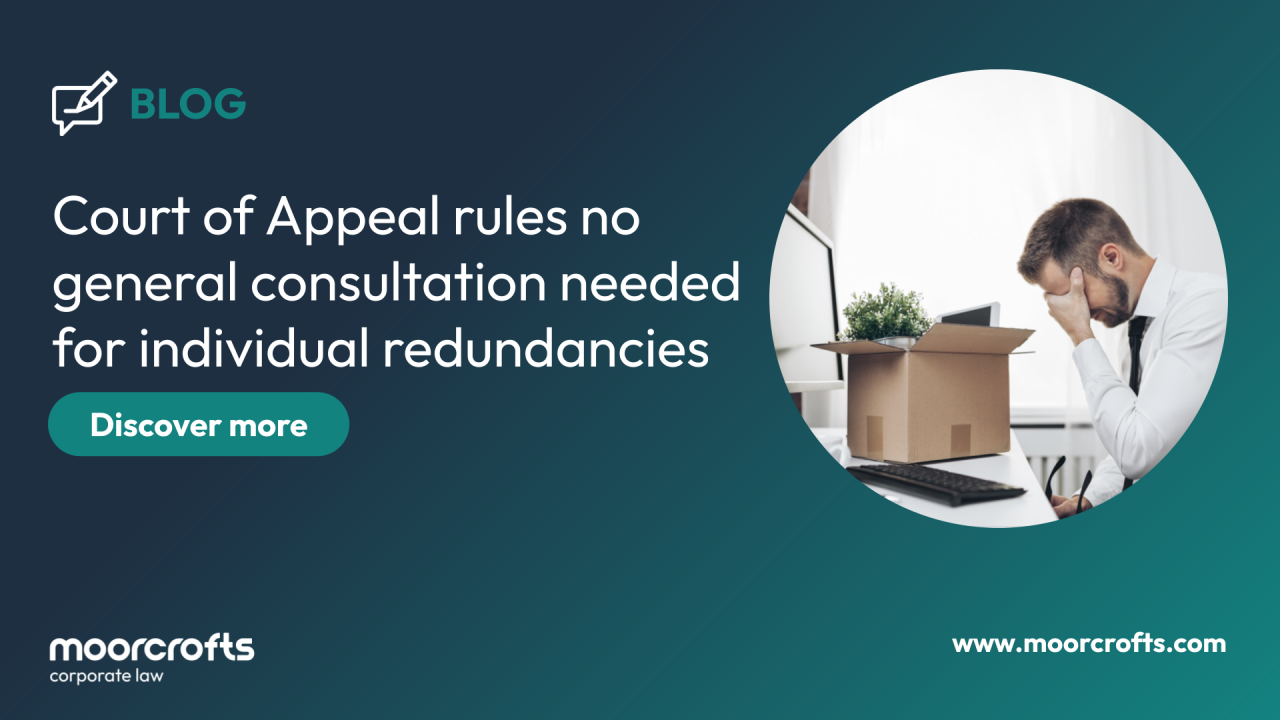Court of Appeal rules no general consultation needed for individual redundancies
The Court of Appeal recently overturned an Employment Appeal Tribunal (EAT) decision, clarifying that employers are not required to carry out general workforce consultation for an individual redundancy dismissal to be fair. This ruling restores practical clarity for employers, particularly in cases where collective consultation obligations do not apply.
The case arose from the redundancy dismissal of Mr Haycocks, an employee of ADP, during the early stages of the COVID-19 pandemic. ADP’s decision to reduce headcount followed a sharp decline in demand. The selection process was based on subjective scoring criteria determined by ADP’s US parent company.
ADP consulted individually with Mr Haycocks across three meetings. He was informed of the redundancy situation and invited to discuss alternatives, however, he was not shown his individual scores until the appeal stage, nor given the comparative scores of his colleagues.
The tribunal rejected Mr Haycocks’ unfair dismissal claim, finding the redundancy process fair overall. However, the EAT overturned this, holding that fair redundancy consultation required general workforce consultation at an earlier stage. ADP appealed this decision to the Court of Appeal.
The Court of Appeal allowed ADP’s appeal, holding that individual consultation can be sufficient and that fair redundancy consultation does not necessarily require consultation with the entire workforce where collective consultation obligations do not apply. Adequate consultation can be achieved through discussions with affected individuals.
The EAT’s suggestion that general workforce consultation was necessary introduced an unworkable obligation on employers, inconsistent with established principles. Requiring group consultation for individual redundancies could cause unnecessary alarm among employees and is not supported by ACAS guidance.
Consultation must occur at a “formative stage,” meaning when the decision is still open to influence, rather than at the earliest possible moment.
While it is good practice to consult employees on selection criteria and share their scores, failure to do so does not automatically render a redundancy process unfair.
The ruling restores clarity and reaffirms that redundancy consultation requirements depend on the specific circumstances of each case. Employers are not obligated to consult the entire workforce in individual redundancy scenarios but must still consult with affected employees individually.
Employers should bear in mind that consultation must be meaningful and occur while decisions are still open to change. Individual consultation remains sufficient, provided it allows employees to understand the decision-making process and raise concerns and best practices, such as explaining selection criteria and sharing scores, should still be followed to minimise risk.
This decision brings welcome relief to employers. The EAT’s position risked imposing significant operational burdens by requiring group consultation even in non-collective redundancy situations, potentially causing unnecessary anxiety among employees.
The Court of Appeal has taken a pragmatic approach, preserving the distinction between individual and collective redundancies.
Employers should take note of this judgment and ensure their redundancy processes remain compliant with fairness principles, focusing on meaningful consultation with affected individuals.
Contact us
For employment law advise, contact our Employment Partner, Lindsey Abbott.



